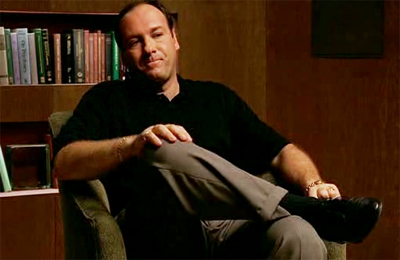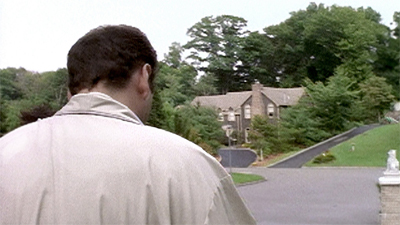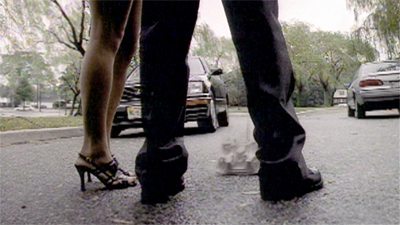I feel like I am massively late to the party. Not fashionably late, mind you. However, my gran received The Sopranos on DVD for Christmas, and I’ve decided to go back and watch it from the start with her. I’ve seen bits and pieces of the iconic television show over the years – even following it for a full two seasons in the middle – but I’ve never seen David Chase’s dark exploration of the American dream from beginning to end. So, slowly, in the company of my grandmother, I shall be making my way through what many people consider to be the best television show ever produced. And where better to start, after all these years, than the very first episode?
Okay, everybody knows that The Sopranos is a mob drama, following the trials and tribulations of a New Jersey organised crime family as they deal with problems both external and internal. Juxtaposed against the therapy sessions that patriarch Tony Soprano is receiving to manage his anxiety attacks, Chase uses the standard mafia plots to provide his own dark and dry commentary on the American dream. After all, organised crime has always served as the dark underbelly of American success, and it’s a pretty standard movie metaphor to explore the unseemly aspects of the American experience through mob stories like Once Upon a Time in America or Goodfellas or Scarface or The Godfather.
However, Chase is careful not to push the series towards the extreme. Tony Soprano isn’t necessarily the dark side of the American Dream, so much as he is the reality of it. The series tends to fire on all cylinders when exploring the types of experiences that most modern Americans struggle with every day. Indeed, Tony’s anxieties seem to stem from his own family dysfunction as much as they do from dealing with violent men in violent situations. Is Tony’s fear of losing his family (whether through his own failure to hold them together or some outside change in circumstance) that much greater than what any head of any household must feel?
“A lot of Americans feel that same way,” Doctor Melfi assures him, as we’re treated to that iconic shot of Tony collecting a paper from the end of his driveway clad in his dressing gown. He could be anybody in any small American suburb. His job just happens to be running a massive criminal syndicate, rather than a private enterprise, and the series makes it clear that Tony wrestles with his obligation like any white-collar executive working to secure his steady paycheck and standard of living. Tony has an office in the back of a strip club, and he brutally collects for money owed in broad daylight.
He deals with the same problems that most managers and most families face, with children growing up not understanding the hardships and the difficulties of obligations and responsibilities. Tony takes his daughter Meadow to a church that his ancestors helped build, as if on a pilgrimage, but she’s only interested in her skiing trip to Aspen. Christopher, Tony’s nephew and the closest member of his family involved in the family business, doesn’t seem to worry about trying to pull a sickie. “My mother said I shouldn’t come in today,” he tells Tony. As Tony points out to Doctor Melfi, “bear in mind this is a kid who just bought himself a 6000 dollar Nexus.”
Christopher dreams of getting rich quick selling Hollywood screenplays, whining and moaning about how he hasn’t attained the lofty station he seems to deem his by divine right. The kids seem to have no idea about how the world really works, and no interest in earning what they feel they have a right to. Tony laments this decay in moral character. “Whatever happened to Gary Cooper?” he asks, ranting about how pointless therapy is. “The strong silent type. That was American.” Maybe it was, in the past tense.
Even Tony himself has drifted slowly out of touch with his past, seemingly connecting to his heritage through popular cinema. Here Chase evokes that popular story about The Godfather, suggesting that the mob only took up the habit of kissing the don’s ring based on Coppola’s film. Tony’s favourite scenes in the trilogy see Vito returning home, perhaps expressing his own desire to reconnect with his roots, and perhaps explaining how the ducks in his pond affected him so much – flying off home. Of course, even those relatively soft cultural moors end up eroded away from one generation to the next – Christopher can’t even bother to get his Godfather reference correct.
In scenes that pack more punch today than when they were originally written and performed, we’re told that “things are down across the board.” Junior remarks, “We used to be repression-proof, but not anymore.” Sure, this particular family business might involve assassinating other criminals moving in on your turf, but it’s all about numbers and the bottom line. It has to worry about turning a profit, with meetings conducted like any other business.
Chase’s script is wonderful. We see a lot of the familiar devices and elements that he’d return to time and time again over the run of the series. In particular, he shows a deft skill at metaphor, as Tony takes a family of ducks under his wings. The series would see a lot of wildlife encroaching on the Sopranos backyard, perhaps allowing Tony to engage his more primal side, free of the worries and conventions and obligations of society. I think it’s quite telling that the family’s pool sees more use a duck pond than a swimming pool.
Even with my somewhat limited knowledge of what lies ahead it’s still interesting to spot just how many ideas Chase had that would come to flower down the line. I wonder if he knew from the start where these references would lead – Tony returning to Italy, Christopher writing a script – or if they just developed organically. Either way, it is pretty damn impressive and a testament to his skill. The cast is great, even at this early stage, though I do think it took them a while to settle in. I do note that HBO’s video quality from this sort of time-period does look a little dodgy, especially compared to later seasons – but this seems to be the case with all their shows.
Either way, we’re off to a flying start. I might share an odd review or commentary as gran and I make our way through the show’s impressive run. If I can convince her to stick with it.
Filed under: Television | Tagged: american dream, arts, Christopher, David Chase, Gary Cooper, godfather, hbo, history, Melfi, review, Silvio Dante, Soprano, sopranos, Steven Van Zandt, Television, the sopranos, the sopranos (pilot), Tony, Tony Award, Tony Soprano, tv, United States |

























Leave a comment